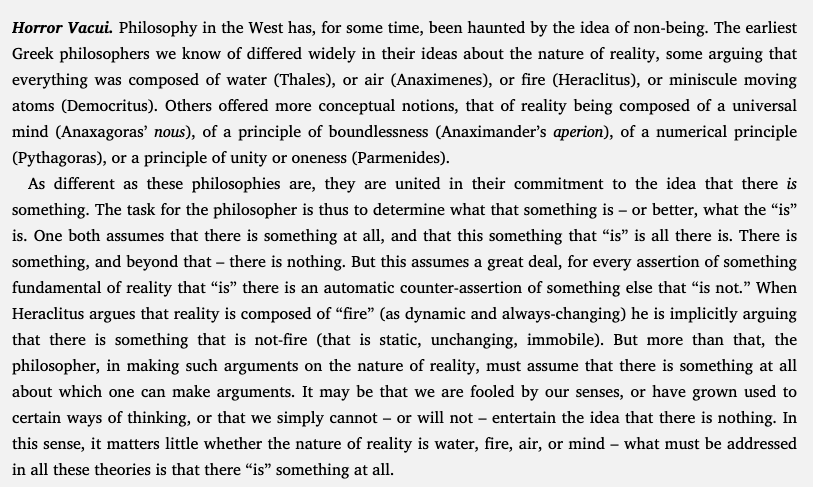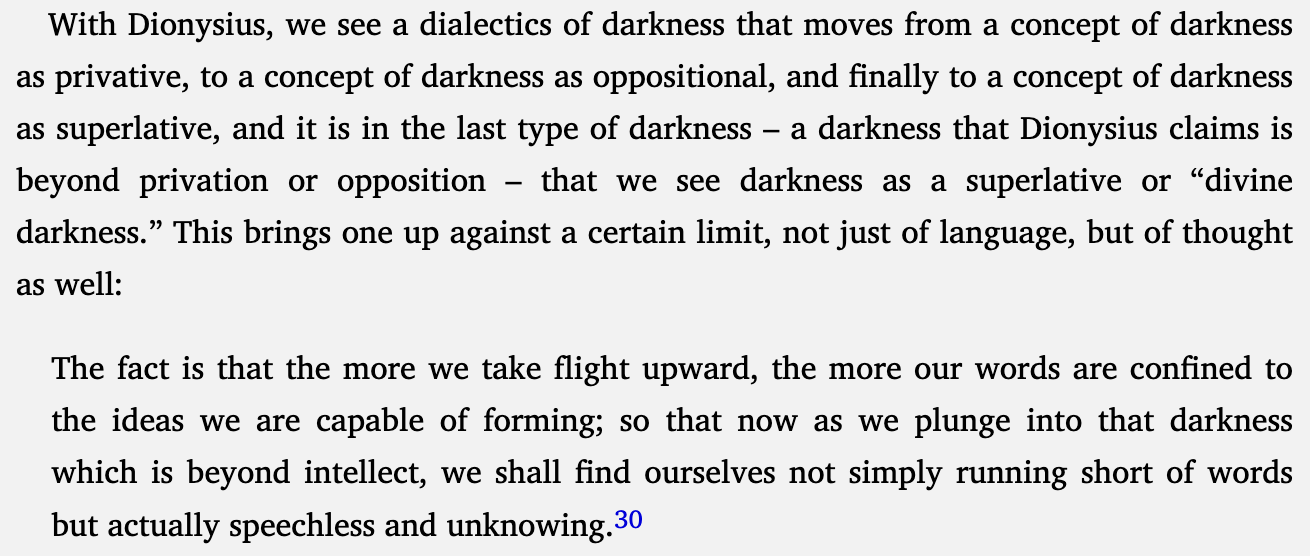Eugene Thacker
21 Jul 2023 - 30 Jul 2023
- WS Book Club is reading Starry Speculative Corpse by Eugene Thacker
The proposition that governs this book, Starry Speculative Corpse, is that something interesting happens when one takes philosophy not as a heroic feat of explaining everything, but as the confrontation with this thought that undermines thought, this philosophy of futility.
Ch 1
What Kant doesn’t consider is that reason might actually be connected to depression, rather than stand as its opposite. What if depression – reason’s failure to achieve self-mastery – is not the failure of reason but instead the result of reason? What if human reason works “too well,” and brings us to conclusions that are anathema to the existence of human beings? What we would have is a “cold rationalism,” shoring up the anthropocentric conceits of the philosophical endeavor, showing us an anonymous, faceless world impervious to our hopes and desires.
- Um, I mean, isn't this the default? Maybe I've spent too much time in the techsphere, but this is a view everybody has, more or less.
This is the crux of the “horror of philosophy,” which we see in Descartes’ demon, Kant’s depression, and Nietzsche’s wrestling with an indifferent cosmos. Put simply, it is the thought that undermines itself, in thought. Thought that stumbles over itself, at the edge of an abyss.
- Yawn. I mean, this is news? Thought has been undermining itself for the better part of a century, hasn't it?
Far from dismissing philosophy, I would argue that this makes philosophy interesting. Particularly if one “mis-reads” philosophy in this way. If we were to adopt a method, it might be this: read works of philosophy as if they were works of horror...The proposition that governs this book...is that something interesting happens when one takes philosophy not as a heroic feat of explaining everything, but as the confrontation with this thought that undermines thought, this philosophy of futility.
- OK that sounds a bit more interesting.
Ch 2
- Afraid of the dark, of the unknown and unknowable. Darkness as non-being, negative yet positive.
- Darkness mysticism. Georges Bataille, Dionysius the Areopagite, Meister Eckhart.
mysticism of the unhuman
- I am skeptical, somehow this all seems like ridiculous goth-y posturing. I say this as someone marinated in the unhuman, its not so easy to escape being human, you end up bringing yourself along.
- Attempts to describe and categorize and characterize darkness seem to miss the point – I'm sure Thacker is aware of the contradictions.
Importantly, Angela [of Foligno] qualifies this by noting that the divine is “dark” not only because it surpasses human comprehension, but because in so doing it renders the human insignificant.
The Cloud is an example of what scholars have referred to as “affective Dionysianism,” a mixture of poetic and theological ruminations on the divine as inaccessible, incomprehensible, radically non-human. At its most intense, The Cloud advocates for a spiritual exercise that entails a successive stripping away of the self, so that it may be ready to encounter the impersonal, formless “cloud” of the divine.
Therefore, it is my wish to leave everything that I can think of and choose for my love the thing that I cannot think.
Ch 3

- for the Users Guide to the Foundations of Reality file
- but really this is stupid. Or, maybe not if its in the form of Buddhism, but as practical western thought it just seems dumb. Almost immorally so. Stupid word games.
Granted, while the possible reply “there is nothing” does not prevent philosophy from continuing – if anything, philosophy finds a new task, which is to state, with all the contradiction it implies, “there is nothing” – the reply “there is nothing” prompts us to question some fundamental premises of both the philosophical project and philosophical thought.
- Yeah tell me about it
- Heidegger. Being in-itselv vs entities. Yawn. Argh. Foo.
Being is not one being among other beings, but that which is common to all beings.
- Yeah OK, very clever language games, and the point is clear, rather theological,
- Actually summary of Heidegger and Sartre good, interesting. But still all sounds like Buddhism knows how to talk about this and Western Phil does not.
- The Sarrte cafe story makes no sense to me. Having unmet expectations is an everyday occurence and no, it does not open up the trapdoor atop the hell of nihilism.
- Badiou on the empty set. Yawn again.
This in turn leads to the necessity of thinking the divine as unrelated to the ontological categories of being and non-being – the God beyond Being, the Godhead beyond God. Hence in another variation Eckhart notes: “God is a nothing and God is a something.” This is a recapitulation of the Dionysian assertion of the nameless God, the God without attributes or properties, the God to which no name is adequate. Eckhart, in other sermons, will frequently describe this God-beyond-Being as “the One.”
- The Eckhart Four Definitions of Nothing section.
In his commentary and exegesis on “nothing” Eckhart highlights one of the central problems in medieval philosophy – the nature of the relation between human and divine. In so far as the divine is conceived of in radically non-human terms (non-anthropomorphic, abstract, inaccessible, and “dark”), the divine is, in and of itself, not some thing among other things, not a being among other beings – the divine is, strictly, “nothing.”The dilemma, then, is how the human being, which is finite, actual, discrete, and bodied, how this human being can relate at all to the divine, when the latter has been characterized as non-relatable.
- Hm yes that is the right way to think about the divine, except
- this is just another reflection of mind-body dualism.
- see the Heschel argument for god-as-person
- Ah:
But Eckhart, too, runs into problems. For one, any careful reading of Eckhart must acknowledge that this talk about God as nothing, the immanent Godhead, and the arid, empty, unhuman desert is always doubled by an equal commitment to the Trinity, the kenosis or self-emptying of Christ, and a Person-oriented mysticism of Father, Son, and Human.105 Put simply, the “philosophical” Eckhart is always correlated to the “theological” Eckhart. Both are, perhaps, brought into an uneasy relation, and it is this assemblage that constitutes the “mystical” Eckhart.
- Kyoto school – should know more – Nishida Tanabe Nishitani
One of the distinguishing aspects of the Kyoto School is their unique combination of Mahāyāna Buddhism and German Idealism
- Yow. Ah Meaningness has an opinion
This theory was developed by Suzuki together with the Kyoto School. That was a group of Japanese philosophy professors, founded by a close friend of Suzuki’s, devoted to synthesizing Buddhist and Western philosophy. Their work was world-class—brilliant. Unfortunately, the main Western philosophy they chose to integrate with Buddhism was German Romantic Idealism. That philosophy is long-since discredited in the Western world. It is also, in my personal opinion, mostly wrong and harmful. Suzuki presented this mash-up as the original, true, pure Zen; but also as not particularly Buddhist. Zen was, instead, the mystical essence of all religions; just as much a part of Christianity as of Buddhism.
- Argh correlation, the worst idea (or perhaps I don't understand it)
- nihilty, nihilism, nonbeing, nothing, nothingness, sunyata. Subtle differences between these that I can't quite grasp, honestly.
Ch 4 Prayers for Negation
- extremophiles, some cringe mis-science there, but whatever.
Microbes existing in the conditions of the absence of light or oxygen – indeed, feeding off of the absence of light or oxygen – are an anomaly for biological science.
- Argh no they aren't, absence of oxygen was the default for early bacteria.
- Ontology of generosity.
- Idealism: Ficht, Schelling, Hegel. I don't know these at all and don't want to.
- Ascenscionism
Life is elevated and raised up, beyond the human and beyond nature, even beyond the divine. We can call this kind of thinking ascensionism, as it denotes the process by which the concept of life is raised up to the status of a metaphysical principle. Ascensionist thinking has two forms, both of which we can still see today
- 2 kinds, don't understand the difference, but cites links to panpsychism, pantheism, vitalism, etc.
Schopenhauer’s sentiments regarding German Idealist thinkers is well known. He despised them.
- My man
But the greatest effrontery in serving up sheer nonsense, in scribbling together senseless and maddening webs of words, such as had previously been heard only in madhouses, finally appeared in Hegel. It became the instrument of the most ponderous and general mystification that had ever existed, with a result that will seem incredible to posterity, and be a lasting monument of German stupidity
- Actually explained Schopenhauer in terms of Kant in a way that clarified them both (Representation is Kant's phenomena, Will is noumena, things-in-themself).
Schopenhauer distances himself from Idealism by opposing the ontology of generosity that it puts forth.170 As Schopenhauer comments, “everywhere we see contest, struggle, and the fluctuation of victory, and… we shall recognize in this more distinctly that variance with itself essential to the will.”171 Schopenhauer provides a veritable compendium of examples from the sciences, though they read more like scenes from a monster movie: insects that lay their eggs in the bodies of other host insects, for whom birth is death; the internalized predator-prey relationship in the hydra; the ant whose head and tail fight each other if the body is cut in two; invasive species such as ivy; giant oak trees whose branches become so intertwined that the tree suffocates. His examples continue, up through the cosmic negation of black holes, down to the basic chemical decomposition of matter in the decay of corpses, where life is defined by the negation of life.
- Huh is a conflict theory guy, didn't know that
- Shaviro, panpsychism vs eliminativism
- Musings
- I guess I want my philosophy to be practical and tool-like. Mystical religion is OK, seems appropriate.
- Huh Thacker wrote an introduction to Techgnosis? Not in my edition, should track that down.
